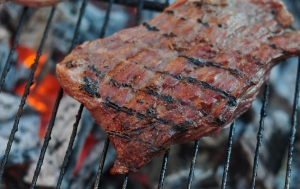But, experts at The University of Texas MD Anderson Cancer Center say that small changes to what — and how — you grill can keep cancer off the menu.
"The good news is that you can do something to reduce your risk of colorectal cancer," says Sally Scroggs, health education manager at MD Anderson’s Cancer Prevention Center. "And, making just a few cooking adjustments when grilling can play a part in prevention."
Scroggs recommends these tips for a healthier barbecue:
1. Avoid processed meats.
Skip processed meats like bacon, ham, pastrami, salami, sausage, hot dogs and pepperoni. Cancer-causing substances form when these meats are preserved, says the American Institute for Cancer Research. And, eating these meats can damage a person’s DNA, increasing the risk of colorectal cancer.
2. Limit red meat.
Eating too much red meat like pork, lamb and beef (including hamburgers) can raise a person’s cancer risk. Try grilling skinless chicken breasts and fish instead.
Insist on red meat? "Limit yourself to three, six-ounce (cooked) servings per week," Scroggs says. "One serving is the size of two decks of cards."
3. Don’t char or burn meat, poultry or fish.
Charring, burning or grilling meat, poultry and fish over high temperatures causes heterocyclic amines (HCAs) to form. These HCAs can damage a person’s genes, raising the risk for stomach and colorectal cancers.
To avoid HCAs:
- Stick with fish. Fish contains less fat and cooks faster than meat and poultry.
- Lightly oil the grill. This keeps charred materials from sticking to your food.
- Pre-cook food. Cook meat, poultry or fish in the microwave or oven for two to five minutes, then finish them on the grill. Less grill time means less exposure to cancer-causing chemicals.
- Lower the temperature. For a charcoal grill, spread the coals thinly or prop the grill rack on bricks. This reduces the heat by increasing the distance between your food and the coals. And, use barbecue briquettes and hardwood products, such as hickory and maple. They burn at lower temperatures than softwood (pine) chips.
- Scrub the grill. Cleaning the grill after each use prevents harmful chemicals from building up and transferring to your food.
4. Use a marinade.
Marinating meat in vinegar, lemon juice and herbs such as mint, rosemary, tarragon or sage can reduce HCA formation by as much as 96%. Just 30 minutes can help.
5. Trim the fat.
Cancer-causing polycyclic aromatic hydrocarbons (PAHs) form in the smoke when fat from meat, poultry or fish drips onto the heat source. That PAH-filled smoke then coats your food. Curb exposure to PAHs by trimming fat from meat before grilling. Or, choose cuts labeled "lean."
6. Showcase fruits and veggies.
No barbecue should be a meat-only affair. Grilling fruits and veggies is a great way to load up on vitamins and nutrients that help your body fight off diseases like cancer.
"For some grilling enthusiasts, these changes might initially be a lot to stomach," Scroggs says. "But updating how you barbecue may mean you continue to enjoy grilling for many summers to come."
For more healthy grilling information, visit www.mdanderson.org/focused.

